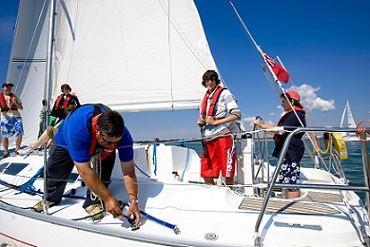Teamwork when at sea can be the difference between winning and losing in big events, while it can also have a dramatic impact on whether people enjoy sailing.
Many sailing courses place an emphasis on team work as it can enhance the experience of all of those taking part.
The best sailors are those that devote time and effort into training and getting things right, while RYA training courses that are aimed at all levels of ability are a good starting point.

When people learn to sail, the majority of them are all in the same boat – they lack experience and the necessary skills to sail to a high standard.
That is why sailing training courses exist, in order to develop skills and natural ability so that those undertaking sailing can be comfortable when on the water.
In larger vessels, teamwork is especially important as there are simply too many jobs for one person to do on their own.
Simply put, if someone does not work hard enough in these situations, then the chances are that the boat will lose speed and that something will go wrong.
It means that those on the boat are directly linked to everyone else on board, and that their actions can impact upon others – highlighting responsibility as much as the need for teamwork.
Teamwork is also important if something does go wrong, as putting it right as quickly as possible becomes the next challenge.
At the same time, those on the courses can learn and assist each other, boosting their learning further and teaching them more than is possible with just an instructor doing the talking.
Once the basics are completed, it’s then time to decide on how best to improve further.
All sorts of practical training courses are available to improve many different aspects of a sailor’s skill-set.
From courses specialising in yachting or power boating, to essential aspects such as first aid and survival, each course aims to develop specific skills that will help when at sea.
Recognising how these courses could benefit the development of those learning to sail is key, as small improvements in technique can make a big difference.
If you’re unsure which courses could be most beneficial for you, the Boating Hub has some additional guidance which may help.
With the right training and determination, there is no reason why you could not achieve similar feats as four-time Olympic champion Sir Ben Ainslie.
When it comes to competitive sailing, being the fastest relies on working together with anyone else on board in an efficient manner.
From two-man boats to very large vessels with huge crews, only working together will provide the best chance of success.
Every member of the team will need to co-ordinate every manoeuvre to the best of their ability if they are to win events.
It also means that everyone is looking out for each other, a vital aspect when spending time on the water.
Roles and responsibilities vary depending on the boat involved, so specific day skipper training courses could help to improve an awareness of how to handle the craft concerned.
Competitive events occur on a regular basis, ranging from the Americas Cup and Olympics, to much smaller events at regattas all across the globe.
Elsewhere, the elite can also compete in the Extreme Sailing Series , where ability and teamwork are pushed to the max.